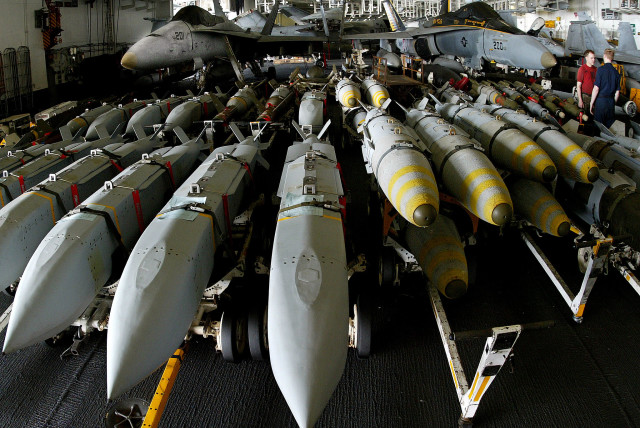Netanyahu doubles down on decline in US arms shipments despite White House comments

"Certain items arrived sporadically but the munitions at large remained behind,” Prime Minister Benjamin Netanyahu said.
Prime Minister Benjamin Netanyahu defended his very public dispute with the White House over a slowdown in the shipment of arms to Israel, noting that he was duty-bound to speak out about the sharp decline.
“Four months ago, there was a dramatic decrease in the munitions coming to Israel from the US,” Netanyahu said during the weekly government meeting.
He spoke as Defense Minister Yoav Gallant was in Washington, where the issue of arms is one of the topics on his agenda.
“In light of what I have heard over the past 24 hours, I hope and believe that this issue will be resolved in the near future,” Netanyahu stated.
“For long weeks, we turned to our American friends and requested that the shipments be expedited. We did this time and again. We did so at the highest levels, and at all levels, and I want to emphasize – we did so behind closed doors,” Netanyahu stated.
“We received all sorts of explanations, but one thing we did not receive; the basic situation did not change. Certain items arrived sporadically but the munitions at large remained behind,” he said.
“After months in which there was no change in this situation, I decided to give this public expression. We did so out of years of experience and the knowledge that this step was vital to opening the bottleneck,” he said.
“I expected that this would entail personal attacks against me at home and abroad, as happened,” Netanyahu said. He recalled that in the past he has withstood such verbal assaults when he took a stand against the Iran deal in 2015.
Similarly, he said, he has pushed back at the US when he “opposed the establishment of a Palestinian terrorist state, and as is now happening when I oppose ending the war while Hamas remains in place.
“But I am willing to absorb personal attacks on behalf of the State of Israel,” Netanyahu stated.
Pushback from the White House
He issued similar statements on Friday in an interview he granted to Punchbowl News. The White House and the State Department have disputed his claim.
A White House official said on Sunday, “We have made our position clear on this repeatedly and we are not going to keep responding to the Prime Minister’s political statements. We look forward to constructive consultations with the Defense Minister in Washington this week.”
Opponents in Israel have accused him of playing domestic politics at the expense of Israeli-US relations. Opponents in Israel have accused him of playing domestic politics at the expense of Israeli-US relations. Several high-level Republican senators, however, have backed him, insisting that the Biden administration was slow-walking arms deliveries to Israel.
Senator Lindsay Graham wrote on X Sunday that he had met with Gallant, assuring him he would work with his colleague in the House and Senate “to make sure there is congressional oversight of weapons delivery to Israel.
“The package to supply them weapons was supported by an overwhelming bipartisan majority, and the United States must provide these weapons accordingly,” Graham stated.David Makovsky, a senior fellow at the Washington Institute for Near East Policy and a former editor-in-chief of The Jerusalem Post, broke down his understanding of the arms shipment delay in a post on X.
The “US has provided reported massive $7.5 billion in weapons to Israel since October 7th. Much of the weapons came in ongoing airlift with US high-level written emergency authorization that overrode any typical lower level bureaucratic reservations/objections including congressional procedure,” he wrote.
“At some point in recent months,” he explained, the “US seems to have returned to normal inter-agency procedure of authorization,” he explained. By doing so, the “US can deny it is not halting shipments but just returning to standard operating approach.”
The issue has become acute for Israel as prospects for a hostage and Gaza ceasefire deal seem slim and Israel faces the prospect of protracted conflict with Hamas in Gaza and a third Lebanon war against Hezbollah.
Jerusalem Post Store
`; document.getElementById("linkPremium").innerHTML = cont; var divWithLink = document.getElementById("premium-link"); if (divWithLink !== null && divWithLink !== 'undefined') { divWithLink.style.border = "solid 1px #cb0f3e"; divWithLink.style.textAlign = "center"; divWithLink.style.marginBottom = "15px"; divWithLink.style.marginTop = "15px"; divWithLink.style.width = "100%"; divWithLink.style.backgroundColor = "#122952"; divWithLink.style.color = "#ffffff"; divWithLink.style.lineHeight = "1.5"; } } (function (v, i) { });

